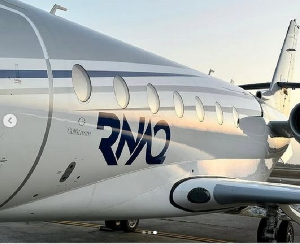Benjamin Tawiah, London
A fortnight ago, Gene Robinson, the openly gay Anglican Bishop, was news again. About 200 bishops boycotted an important international conference because of him. He is seen as a divisive factor in a Christian body that had stood together until he was ordained bishop of New Hampshire in America. While his British host must have felt the pressure, I gleaned from the confusion an important statement that the gay preacher made: “There is so much that bind us together than there is anything that divides us.” That for me is a truism. The credit crunch crunches all of us, doesn’t it? We all need bread to survive, and when the price of cookies goes up, those who can afford to buy from expensive supermarkets are as vulnerable as the destitute that will never be able to buy any. The resultant insecurity that extreme hardship brings is borne by all: the super rich, the rich, the poor and the very poor. We are almost unanimous that the big creditors in Europe and America may not have cushioned us very well, even in the face of repressing global prices of fuel and food. So, there is a recession of a sort. Or, to cast it in a less depressing phraseology, life everywhere has become quite challenging and expensive. Those who prefer to look at it from the political angle blame the crunch on the billions of dollars that have been ploughed into Iraq and Afghanistan, which have to be recouped. Hence, the big creditors have had to crunch us all, necessarily cutting down on credit and squeezing the flow of capital, in order to reach set targets. There may be different shades of reasoning on this, but we all feel the crunch somehow, and it binds us together.
It seems the crunch is crunching people’s brains as well. I felt a bit of it myself last week when I came across a long queue of people waiting anxiously to take turns to rape British banks in broad daylight. An Automated Teller Machine (ATM) had gone mad, discharging thousands of pounds to anybody who had fingers. The machine had become so generous that it multiplied any figure you requested by the square root of any number you could imagine. When you punched £10, it gave you £100; £20 gave you £200 and so on. The good thing about this was that the receipt that came out showed the amount you requested, not the amount counted, so your accounts were not debited in respect of the lump-sum. I was shocked to see the honourable faces of men and women who had gathered to steal money. Some of them were very nicely dressed in expensive-looking suits, most of whom had parked their Jaguars and Jeeps for the bumper. Others were faithful-looking sub-working class hourly paid workers, who had neither dignity to protect nor a penny to spare. I was walking with a prayerful Christian sister, so I didn’t know what to make of the harvest. I thought I could get my fair share of the free money, divide it into ten and pay a percentage as tithe to my new church, but I was reminded of the Cain and Abel story. Well, I left the scene with my evil thoughts intact, cursing the company of the tongue-wagging Christian sister. As it turned out, she didn’t see anything wrong with the bonanza. The crunch seems to have crushed her faith in the Lord.
Newspaper reports the following day blamed the friendly theft on the credit crunch. Folks had lost their values because of the increase in the prices of food and oil. The papers did not find it strange that nobody had phoned the police. I couldn’t help thinking that the porters at Commonwealth Hall, University of Ghana, had been angles when they phoned Ghana Telecoms to complain about a newly installed public telephone that had gone crazy in similar circumstances. In typical Vandal fashion, students had lined up from the Porter’s Lodge to the library, waiting for their turn to talk away. Those who spent too much time were booed: Go away, Go away, chewer, amidst Oh Ah, Oh Ah. However, callers who were overheard speaking to girls were allowed a lot more time. The comments had been: Wano wham, champion muncher, munching mate, among other chewer-induced obscenities. As is typical of Vandalism, students who wear their ‘munching’ credentials on their foreheads are pure virgins; they have seen naked women only on television screens. Folks had made calls to far away Japan and as closer home as Tweapease, where the only mobile phone in the town was on low battery. Those porters, most of them under £18 a month, have no credit to be crunched. Yet, they had a sense of responsibility to restore sanity. Well, maybe they are not that responsible; the thing is, poverty has a way of humbling the crunched soul, especially when there is not so much to hope for, except looking into the Heavens and praying for Hell fire to crunch us all.
It is one thing having credit and quite another having it crunched. You can only experience credit crunch if you have some credit. For some people, the best thing that happened to them is the credit crunch, because they have actually never had any credit in their life. How are some poor folks in Ghana managing the credit crunch? The British Prime Minister, Gordon Brown, has been doing a lot of face-saving, explaining himself away by blaming the crunch on global prices of some commodities. Things have become expensive everywhere. Before the crunch, kenkey in Ghanaian shops in London sold for £1.50pence. Today, it is £1.80 pence, and the crunch seems to have affected the size, too. Anytime I manage to prepare my favourite abunuabunu soup tamed with smoked salmon, better if perfumed with prekese or nearly expired momone, I am unable to enjoy it. It is not only because of the apology of the cook that I am; it is mainly because the amount I spend on the soup is the same I paid for a distant cousin to start off as an apprentice in a hairdressing shop. And to be very honest, even though figures show that we are a model African country, life in Ghana has not improved very much in the last couple of years. People in Britain talk of feeling the credit crunch; in most parts of Africa, some people have been crunched so hard that they live the crunch. Perhaps, that is why folks in Ghana wonder how many baskets of bread the millions spent on the recent awards could have purchased for the very poor. It is a legitimate feeling; it has nothing to do with politics or the mismanagement of it. Where the crunch is part of daily life, luxury is anything that does contribute directly in halving the hardships in a peasant-urban existence.
So, how did the crunch come about? Conservative politicians in Britain explain the crunch in a very interesting way. Labour presided over an economic boom for a decade under the chancellorship of Gordon Brown, but they did not put in place measures to protect Britain against future economic difficulties. So, the crunch was due to lack of foresight and bad Brown economics. As a result, the British treasury has recorded the worst budget deficit since the Second World War, prompting the Labour government to rethink its rules on public borrowing and other fiscal measures. Instead of borrowing to invest, as Brown economics had always decreed, debts have been incurred to get things going. But it is not only Britain that is presiding over an unsustainable investment climate; other bigger economies are also in the red: America (60.8), Germany (63.2), France (64.0), making Britain’s 38.3 only a little worse than Spain’s 35.2.
Figures sometimes complicate our understanding of certain things. Here is another way. The sub-prime mortgage market in America, which made it possible for folks with meager earnings to borrow big money, added to the woes of the financial market. They just could not pay back the loans. Folks just vamoosed and left their houses behind. The banks were interested in lending without assessing people’s capacity to honour their contractual obligations. So who takes care of the debt? The banks of course; they gave the monies out. We heard that banks actually sold the debts to other banks. And as is natural in many situations of insolvency, there was the need to squeeze the flow of credit. That meant cutting down on how much folks borrowed. The effect was that people could not feel cash in their pockets as it used to be, forcing purchasing power to go down.
What about the story of the wars? The figures vary, and they are quoted variously in various situations. America has spent some $1.5Trillion on the wars in Afghanistan and Iraq since 2001, according to the Democrats. The UK may have pumped in some £3.3billion. Oil production in Saudi has improved, nearly doubled over this period. Folks suspect that the billions spent on these wars have affected the budgets of the warring West, so the crunch has had to occur to get some of these monies back. I was thinking that if oil production in the Arab world really did double, why should the price of oil increase? And as we know, when fuel prices increase, nearly everything is affected. I don’t know what to make of this oil story. It sounds like a diabolic crunching deal, isn’t it? The whole crunching economics sounds like dentistry to me. I am familiar with things that are rendered in verses and stanzas. Well, even those too seem to have been crunched, because the sale of books may have gone down in such difficult times.
So, if the crunch is the story of the big fellows in Britain and America, how did the effect trickle down to us? Mark that we had been living the crunch before the wars started. If a 24 year old American refuses to make good his debt, how do folks in Mamobi and Tweapease get to share in the blame? Right, we have done a currency redenomination but we still quote our figures in dollars. Indeed, most of us have dollar accounts, and those accounts hold more money than our cedi accounts. So, when the dollar crushes, we crush, too. Well, the chap in Tweapease may not have seen a dollar note before, so why does he have fork out more money to travel to Asuom and pay a little extra for food?
Well, how will this crunching problem be solved? The Brown government in Britain has been doing a few things to make an impression. For instance, some taxes have been cut and interest rates have gone up. In Ghana too, interest rates were recently reported to have shot up. Regulation in the American financial market would become tighter. Nobody wants to be caught sleeping again. Well, it is not that people had been sleeping; it was worse than that. President Bush puts it even more succinctly: “Wall Street got drunk.” A live microphone picked up the private comment. It was another ‘Yo Blair’ moment. The American President is not known for serious wit or profound talk, unlike his dismissed Defense Secretary Donald Rumsfeld, but he happens to have given the most significant explanation to this boring crunchy affair. Sure, Wall Street was on Beer.
Opinions of Thursday, 31 July 2008
Columnist: Tawiah, Benjamin














